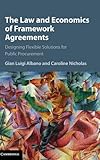The law and economics of framework agreements : designing flexible solutions for public procurement / Gian Luigi Albano, Caroline Nicholas.
Material type: TextPublisher: Cambridge, United Kingdom : Cambridge University Press, 2016Copyright date: ©2016Description: xiii, 342 pages ; 24 cmContent type: text Media type: unmediated Carrier type: volumeISBN: 9781107077966; 1107077966Subject(s): Public contracts | Government purchasing -- Law and legislation | LAW -- Commercial -- International Trade | Government purchasing -- Law and legislation | Public contracts | Framework agreementsDDC classification: 342/.066 LOC classification: K884 | .A95 2016Other classification: LAW014010 | KC233
TextPublisher: Cambridge, United Kingdom : Cambridge University Press, 2016Copyright date: ©2016Description: xiii, 342 pages ; 24 cmContent type: text Media type: unmediated Carrier type: volumeISBN: 9781107077966; 1107077966Subject(s): Public contracts | Government purchasing -- Law and legislation | LAW -- Commercial -- International Trade | Government purchasing -- Law and legislation | Public contracts | Framework agreementsDDC classification: 342/.066 LOC classification: K884 | .A95 2016Other classification: LAW014010 | KC233 | Item type | Current library | Call number | Copy number | Status | Notes | Date due | Barcode |
|---|---|---|---|---|---|---|---|
 Books
Books
|
Female Library | K884 .A95 2016 (Browse shelf (Opens below)) | 1 | Available | STACKS | 51952000243113 | |
 Books
Books
|
Main Library | K884 .A95 2016 (Browse shelf (Opens below)) | 1 | Available | STACKS | 51952000243120 |
Browsing Main Library shelves Close shelf browser

|

|

|

|

|

|

|
||
| K85 .R47 2010 Research methods for law / | K85 .R47 2013 Research methods in law / | K85 .R47 2018 Research methods in law / | K884 .A95 2016 The law and economics of framework agreements : designing flexible solutions for public procurement / | K891.B8 .C48 2016 The law of construction disputes / | K891.B8 .K43 2015 FIDIC plant and design-build form of contract illustrated / | K891.B8 .M435 2016 Mediation in the construction industry : an international review / |
Includes bibliographical references and index.
"Framework agreements have arisen in response to the well documented and high costs of public procurement procedures. The agreements have significant potential to improve procedural efficiency in public procurement, but are complex to operate. Inadequate preparation and implementation can also frustrate their potential both to tackle waste, abuse and corruption and to enhance value for money. In this enlightening book, Gian Luigi Albano and Caroline Nicholas look at the key decisions required for designing and using framework agreements and address both legal and economic issues to give the reader a clear understanding of the planning, variables and flexibility needed for efficient implementation. This book will be of interest to policy makers, lawyers and public procurement practitioners who want to deepen their understanding of the legal and economic issues surrounding framework agreements"-- Provided by publisher.
"Public procurement policy is commonly grounded in terms of promoting best value for money and avoiding corruption, waste and abuse. Well-documented experience of failures in this regard, the enormous economic power of public procurement, and the expansion of world trade and efforts to liberalise it, have led to the development of formal rules governing public procurement at both the international and national levels. Many of those rules, in addition to requiring that procurement officials follow open competition (considered to be the most effective way of securing best value for the government), stipulate "honesty and integrity in source selection, and equality of opportunity for would-be contractors", together with requirements for internal controls, such as documenting decisions and formal approval processes"-- Provided by publisher.
Part I. The essentials of framework agreements: basic definitions, main economic forces and international experience -- 1. Introduction -- 2. Description, taxonomy and motivations for using framework agreements -- 3. Some key economic dimensions in framework agreements -- 4. The economic analysis of framework agreements -- 5. International experience in framework agreements -- 6. International experience in centralised purchasing -- Part Fostering competition and preventing collusion in framework agreements -- 7. Promoting effective competition and enhancing outcomes in framework agreements -- 8. Integrity concerns in framework agreements -- 9. Addressing risks of collusion in framework agreements -- Part III. The Design of framework agreements -- 10. Essential issues in framework agreements for the individual buyer -- 11. Framework agreements for centralised procurement -- 12. Legal and regulatory issues in framework agreements procedures.
1 2

There are no comments on this title.